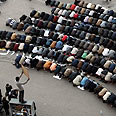
Egyptian policeman: People's demands just
After 800 of its soldiers deploy in Sinai, Egyptian army stresses once again it will not use force against civilians; police forces return to streets, but some officers join protestors. 'Government has no compassion for the people; they treat us like we're not human,' one officer tells Ynet
While the violence in Egypt has subsided over the past few days, citizens are continuing to protest against President Hosni Mubarak, who has ruled over them since 1981. Some 250,000 people gathered at Cairo's Tahrir Square on Monday, and a million Egyptians are expected to gather there on Tuesday for the biggest anti-Mubarak rally since the riots erupted a week ago.
An Egyptian army spokesman said that the army understands the legitimacy of the demands of the protesters in Egypt, adding that the army does not intend to use force on them.
Appearing on state TV on Monday, Ismail Etman warned against any act that destabilizes the security of the country, but emphasized that the army has not and will not use force against the public.
Also on Monday, some 800 Egyptian soldiers deployed in the Sinai Peninsula - with Israel's approval – in an effort to quell the civil unrest, while Egyptian police forces returned to the streets.
One police officer refused. "I was asked to kill protestors, so I decided to resign from my post," Amar Yousef told Ynet. "The head of our unit ordered us to kill protestors who endanger us, but I told him I could not confront my own people."
At the end of the argument, Yousef said, "I threw my weapon down, took off my uniform and joined the protestors. Their demands are just. The Egyptian government has no compassion for the people; they treat us like we're not human."
Cairo resident Ranya Suhil said, "The situation in Egypt is terrible, but I take my hat off to all the protestors for their strong will and say to them – continue to the death."
'There's no cash in the ATMs'
Suhil and other Cairo residents told Ynet of rumors of Mubarak's deteriorating health, "but there is no one who can verify these rumors, and the health of Mubarak the criminal does not interest me."
The Egyptians are also concerned over the dwindling food supplies and looting. Like many other residents of the Egyptian capital, Leila Baladi and her husband Rafik are stocking up on bottled water and essential foodstuffs as chaos engulfs this sprawling city of some 18 million.
"We just don't know what is going to happen," said Leila, who along with her husband was pushing a shopping cart loaded with frozen chicken breasts, fava beans, milk and other items at a grocery store in central Cairo. "People are terrified to death."
Everyday life in Cairo has been turned upside down by the largest anti-government protests in decades in Egypt, which began last Tuesday and have surged since.
Schools are closed and businesses boarded up; the usual bumper-to-bumper traffic is now little more than a trickle; and the capital's famed nightlife has been snuffed out by a 4 pm to 8 am curfew. For Monday, the military extended the hours, saying curfew would start at 3 pm.
Even the Internet and text message services have been blocked for days.
The overriding concern for almost everyone in Cairo remains the fear of lawlessness.
"There's no cash in the ATMs, there's something like 5,000 prisoners roaming the streets and there's no security," said May Sadek, a public relations agent who lives in the middle class Dokki neighborhood.
There have been jail breaks from at least four prisons around Cairo in recent days.
Roee Nahmias, AP contributed to the report
- Follow Ynetnews on Facebook










